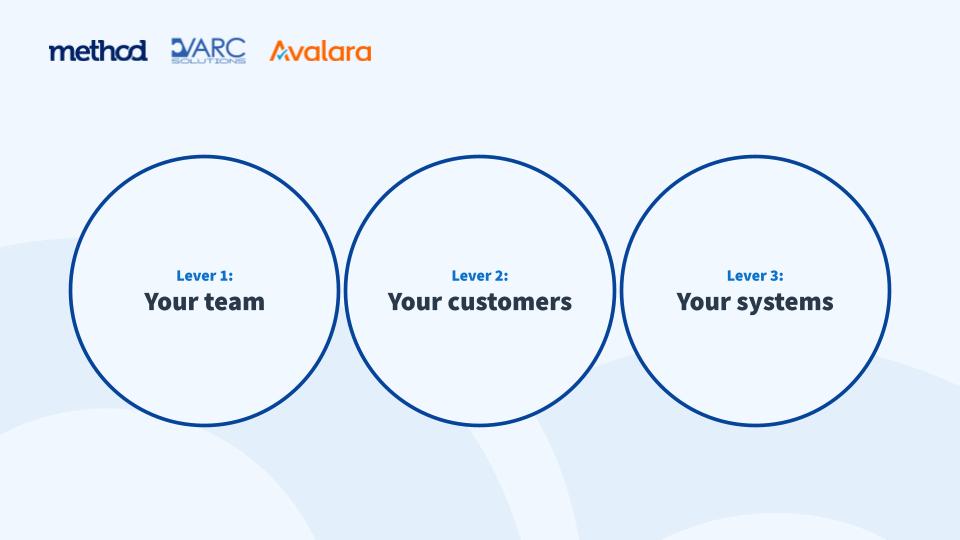3 Efficiency Levers High-Growth Businesses Use to Scale
Running a growing business often feels like a juggling act: expanding customer expectations, clunky systems, and team bandwidth stretched to the max. In our recent webinar, we teamed up with Brad White (CEO of VARC Solutions) and Mike Tribout (SMB Team Lead at Avalara) to tackle one question head-on:
How can growing businesses scale efficiently—without burning out their teams or drowning in operational chaos?
This session unpacked the three biggest levers that drive operational efficiency:
- Your team
- Your customers
- Your systems

Here’s a recap of the conversation and tactical takeaways you can apply to your business today.
Lever 1: Your Team
Let’s face it—people make or break your business. And too often, inefficiency starts internally.
Brad shared a practical framework: Hiring isn’t just about technical skills anymore—it’s about adaptability. In a constantly changing environment, your team needs to thrive on change, not fight it.
What Brad recommends:
- Use tools like Predictive Index to hire and coach based on behavior profiles, not just résumés.
- Don’t forget your existing team. Cross-train, share feedback, and help employees set their own goals to uncover hidden strengths and increase engagement.
- Prioritize fit and collaboration over pure skill. “The best system won’t help you if your team is working in silos or constantly stepping on each other’s toes,” Brad said.
Mike added that this principle also extends to partners: Knowing what roles your team and external collaborators play keeps everything aligned and expectations realistic.
Tactical takeaway: Build clarity and ownership across your org chart. Ensure everyone knows not just their job—but who they rely on, and who relies on them.
Lever 2: Your Customers
Many business owners default to “we just need more leads.” But according to our panelists, that’s a recipe for burnout—not efficiency.
What Brad and Mike recommend instead:
- Get specific about your niche. “The riches are in the niches,” Brad noted. If you’re chasing every customer, you’re spreading your team and systems thin.
- Be ready to say no. Taking on a client outside your sweet spot may lead to higher costs, missed expectations, and unhappy customers on both sides.
- Know your compliance risks. Mike pointed out that adding customers across states or growing your sales volume can trigger tax obligations you didn’t see coming. “One new hire in another state can create a whole new tax responsibility,” he said.
🎯 Pro tip: Map out which type of firm you’re running: procedural, specialized (“gray hair”), or highly customized (“brainy”). Knowing that helps you define your ideal customer—and the team and tools you need to serve them well.
Lever 3: Your Systems
You can’t scale if your systems are stuck in the past.
Brad shared a simple truth: “If your process is inefficient, scaling just multiplies the pain.” That’s why getting your systems in order before scaling is critical.
From method CRM’s side, Matas shared the story of Mobility City—a fast-growing franchise with 50+ locations. They were already using Method, but with dozens of disconnected processes, they couldn’t fully take advantage of their scale. After building a centralized, standardized CRM and item database, they gained:
- Visibility across locations
- Benchmarking and performance tracking
- A single source of truth for work orders and inventory
Mike followed up with a walk-through of Avalara’s automation engine—explaining how Avalara helps businesses eliminate manual sales tax headaches through:
- Rooftop-level accuracy on tax rates
- Automated exemption certificate collection
- Streamlined returns and remittances for all 50 states
Key takeaway: Before you grow, clean up your foundation. Automate recurring tasks. Ditch the spreadsheets. And ensure your tools speak to each other—especially QuickBooks.



